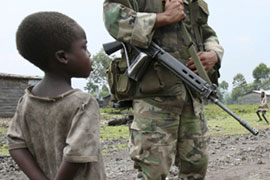UN mission ‘failing’ in DR Congo
Peacekeeping operation has been unable to stop Rwandan rebels operating, UN report says.

The 25,000-strong UN force has been supporting a Congolese military offensive, launched in March as part of a deal to improve ties with neighbouring Rwanda, its enemy during a 1998-2003 war.
The five-member panel of experts sent to DRC to compile the report found that the Congolese offensive had had a devastating effect on the local population.
“Scores of villages have been raided and pillaged, thousands of houses have been burnt and several hundred thousand people have been displaced in order to escape from the violence generated by these military operations,” the report said.
Mineral trading
Lieutenant-Colonel Jean-Paul Dietrich, the spokesman for the UN force, said that the peacekeepers were “quite happy” with the results of the military operation, but acknowledged that “the humanitarian situation does not look as good”.
“We were able to neutralise between 35 and 50 per cent of the FDLR combatants and as well we can say that the they are pushed out of the majority of their economic sites,” he told Al Jazeera from Kinshasa.
| in depth | |||||||||||||||
|
However, the report concluded that although more than 1,200 of the FDLR’s estimated 6,000-to-8,000 fighters have surrendered since the offensive began, it had been able replenish its ranks from both Congolese and Rwandan Hutus.
The group also continues to benefit from the riches generated by the areas vast mineral resources.
Companies continue to purchase minerals from jungle mines controlled and operated by FDLR supporters, while middlemen smuggle millions of dollars in gold to Dubai every year.
Official Congolese records show only a few kilos of gold are exported legally every year, but the country’s own senate estimates that in reality 40 tonnes a year, worth about $1.24bn – leaves the country.
“The [UN] group calculates that the FDLR could earn at least several hundred thousand dollars and up to a few million dollars a year from this trade,” the report said.
The FDLR was formed in refugee camps in eastern DRC housing mainly ethnic Hutus who had fled during the 1994 genocide in Rwanda.
But support networks in Africa, Europe and North America, now finance and command the fighters.
The experts tracked 240 calls between Ignance Murwanashyaka, an FDLR leader based in Germany, and DR Congo fighters, who in turn were in touch with contacts in 25 countries in Europe and America.
Unstable region
Guy Momat, a Congolese journalist and founder of Stop the Congo War UK, said there had been some improvements in North and South Kivu provinces since last year.
“In November 2008 the situation was worse than now: the town of Goma was close to falling to the forces of Laurent Nkunda and you can imagine what could have been the consequences, but now people have regained their place,” he said.
 |
| About 25,000 UN peacekeepers have been deployed to eastern DR Congo [EPA] |
“For the last 12 years that part of the Congo was not stable, so as an observer I think it will take time to bring a proper peace.”
In return for Congo’s pledges to tackle the Hutu rebels, some of whom helped orchestrate Rwanda’s 1994 genocide, Rwanda arrested Nkunda, whose National Congress for the Defence of the People [CNDP] forces were then integrated into the army.
The most aggressive operations against the FDLR have been spearheaded by predominantly Tutsi former CNDP units, some of which are apparently under the command of General Bosco Ntaganda, who is wanted for war crimes by the International Criminal Court.
“General Bosco Ntaganda was enforced by both Kinshasa and Kigali as the de facto military head of the CNDP, with specific instructions to manage and control former CNDP elements integrated in the [army],” the report said.
Under Ntaganda’s leadership, integrated CNDP units are accused by the group of experts of widespread abuses including killings, rape, torture, forced labour, looting and extortion.
